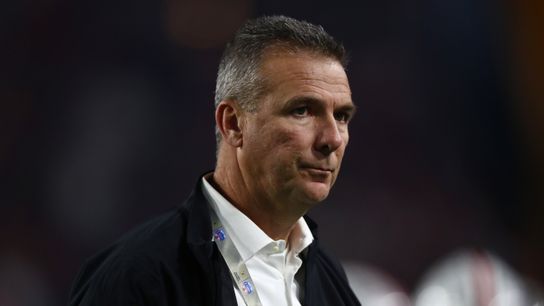Urban Meyer is the head coach of the Jacksonville Jaguars, but he'll always be a college football coach. You are what you are, and Meyer is a man who, save for the 2011 season, spent every year of his life from 1986 through 2018 on a college sideline. In 2019-20, he spent his Saturdays analyzing college football for Fox. He was really good at it, because Meyer is one of the greatest college football coaches of all time.
There were many reasons Meyer excelled in the college game, but they all funneled back to the same character trait: the man is just a relentless competitor. The man simply lives to avoid losing, to the point where it seriously affected his personal health.
Meyer's pathological contempt for losing seeps into every aspect of his coaching, and that will continue to his Jaguars practices.
The Jags staff charts any one-on-one drill, declaring to all within earshot who won the drill and, by omission, who lost.
From The Athletic:
On Wednesday, Jacksonville’s second day in pads, chief of staff Fernando Lovo announced that winners and losers would be charted. Then Lovo spent the rest of practice announcing which player won individual reps so staffers could chart how many times each player won or lost. “WINNER — MANHERTZ,” Lovo bellowed after tight end Chris Manhertz successfully blocked fellow tight end Tim Tebow in a special teams drill.
Later, Meyer himself was the arbiter of wins and losses as offensive linemen clashed with defensive linemen in one-on-one pass protection drills. Like a wrestling referee at the Olympics, Meyer would thrust a hand toward the winning side or raise both hands to indicate a draw. On one rep Meyer simply marveled with everyone else as rookie tackle Walker Little, a second-round draft pick, leveled 2020 first-round edge rusher K’Lavon Chaisson with a vicious — but perfectly legal — two-handed punch to the chest plate.
This isn't just Meyer trying to get his fear of losing to seep from his psyche into his players' DNA. As he explained to ESPN, there's a practical application, too. There are 90 players in Jaguars helmets right now. Between now and Sept. 12, Meyer and his staff will fire more than 40 percent of those players. For most of that 40 percent, this will be the last time they earn an NFL paycheck. These are grown men, with families and bills.
It's a weighty responsibility, and if Meyer is going to unwittingly cast professional football players into civilian life, he needs as much hard-and-cold data to justify the decision as possible.
“A big roster’s going to go to a smaller roster, and I think to be fair to players — we all have so much respect [and] this is a way guys make a living — I don’t believe in subjectivity,” Meyer told ESPN. “I believe in, what’s your record? Every man’s got a record. What is it? You are what your record [is]. If you lose a lot but you have a lot of potential, that’s not real good. . . . Just over the course of my career, I can give you example after example [of players who] maybe they’re a little slow, but they just never lose.”
A player won't get cut specifically because he loses too many one-on-ones, but if it's close between he and a player of similar ability -- for example, a certain Heisman Trophy-winning quarterback trying to make a comeback as a tight end -- one-on-ones could be the difference between a roster spot and a spot on the couch.
"But I've had to make decisions on who starts, and it's not fair to players to say, Well, I'm starting [you] because I like you, or because you're from Ohio. It's just: Here's the stats. They say statistics are for losers, and my comment is usually losers say statistics are for losers.
"So you've got a record. What's your record? How's it going? I just think that's a complete mentality. That Tom Brady guy, his record's really good. You move him to the Buccaneers, it's really good. New England Patriots, really good."
